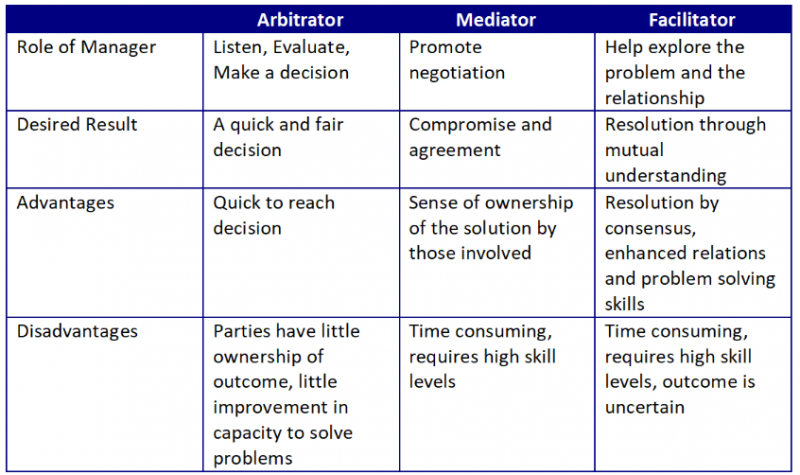Decision Making
When operating a business we are constantly required to generate solutions to problems that threaten the smooth running and viability of our business.
As the owner and/or manager of your business, you need to determine your role in the process of working out; what the problem is; whose problem it is (invariably yours); and what is the best way of solving the problem.
The manager/owner usually has a choice of three roles when solving problems. These are:
- Arbitrator: You make the final decision
- Mediator: An emphasis on negotiation and identifying compromises
- Facilitator: A focus on understanding issues and identifying solutions
The following table summarises the features of each role:

What does this mean for you?
If you need a solution immediately or the short-term - arbitration may be the best method to adopt. However, if you want to build your organisation’s capacity to solve internal problems, so that you as the owner don’t have to do it, then mediation or facilitation may be the best methods to consider.
The roles of mediator and facilitator certainly will take up more time in the short-term, but in the long-term, may save you valuable time and money. And wouldn’t you rather spend time fishing, than continually sorting out problems at work!
Having identified the role the problem solver wishes to take, the next step is to clearly identify the problem. Discussion or research involving the ‘5 Whys’ is a useful starting point. This involves asking ‘why’ about five times before getting to the hub of the problem - A bit like the way young children seek understanding with an incessant drawl of “but why?”. It is important to identify the real problem – not the veneer people want us to believe. In identifying the right problem, you are halfway toward solving the problem. You know when you’ve reached the real problem when the answers make sense and things start to ‘add up’. Once the real problem has been identified (and it’s pointless proceeding to the solution stage until you have the right problem), then you need to identify an appropriate solution.
Solution identification is much easier because, whilst a problem may be new to you, it is unlikely to be new to the rest of the world. This is where you need to use your networks. I have always found that if you are genuine in your search for a solution, people will go out of their way to help – even your competitors. It is important not to let your ego get in the way of asking a question – no matter how silly it seems. As indicated previously, as the business owner - you have the most to lose by a problem remaining unsolved – so it’s your problem!

